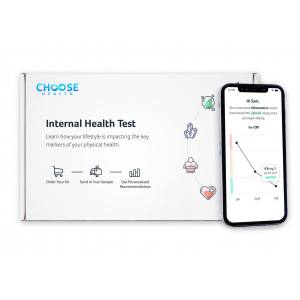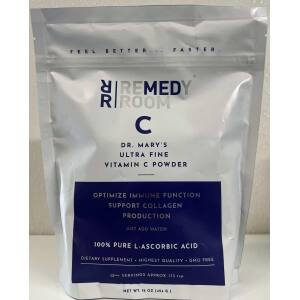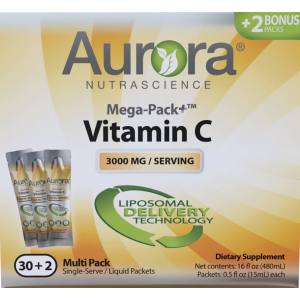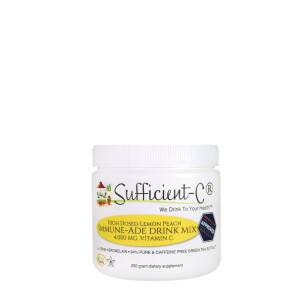A common question from our first time clients is often “Why do I keep getting sick?” Have you found yourself asking the same question?
Cold and flu season is upon us and with kids back in school, sickness spreads fast. Exposure to bugs is inevitable. The question is— is your immune system prepared enough to ward off those potential invaders so you can keep on going with your life, unbothered?
Keep reading for our science-backed guide on how you can stave off illness and this season and beyond. We promise, cold and flu season is smooth-sailing when you’re armed with information and you know what to do to maintain a healthy body.
1. Know (And Optimize) Your Vitamin D Level
Every day we hear from patients who either don’t know their vitamin D level or believe they’re in the clear because their level was in the 20s or 30s. We recommend healthy adults have a vitamin D level between 60 and 80 nanograms per milliliter (ng/mL). We like to remind our patients that here at The Remedy Room we are about optimal levels while labcorp and quest “normal ranges” focus more on how not to be dead. 😉
Vitamin D plays a major role in allowing the immune system to function by binding to immune cells (white blood cells like neutrophils, macrophages and natural killer cells,) and activating them to do their jobs. For example, when vitamin D binds to the receptors on natural killer cells, these cells are then able to seek out pathogens and viruses as soon as they enter the body, activating an immune response to fight them off. Without Vitamin D, our immune cells don’t know what to do! (This is also why there is medically reviewed consensus that vitamin D deficiency is associated with auto-immunity and immune system disorders.) Optimizing your Vitamin D level between 60-80 ng/mL is your first step in building a robust, antiviral immune response.
Test your level by asking your doctor to order a vitamin D blood test, or purchase an at-home test kit and test it yourself. Remember that if you discover your levels are low and it’s time to supplement, not all supplements are the same. We recommend a high quality, vitamin D combo with Vitamin K for healthy supplementing. The presence of Vitamin K ensures that calcium stays inside the bones, where it belongs. You can also supplement Vitamin D with weekly injections at The Remedy Room.
Of course, you can always book a Wellness Consult or visit our clinic or online store to access our Remedy Room approved options.
*Please Note! Vitamin D is fat soluble and excess vitamin D levels beyond 100+ ng/mL in healthy adults may cause harm in certain individuals. If supplementing, levels should be monitored every 3-6 months to ensure the maintenance of a safe and healthy range.
-
Choose Health (Vitamin D At-Home Test Kit)
$89.00
2. Vitamin C!
Our favorite vitamin, the pleiotropic (having multiple effects) mother of all vitamins. Vitamin C is anti-viral, anti-oxidant, antihistamine, anti-bacterial, anti-fungal, antipyretic (anti-fever) and analgesic (anti-pain.) In addition to being needed for proper immune system function, vitamin C is also required for the formation of collagen, absorption of iron, and the maintenance of cartilage, bones, and teeth. The bottom line is that your body requires sufficient amounts of vitamin C circulating in the body at all times for proper function of your immune system and other biological processes.
Humans do not make or store our own vitamin C like the vast majority of other mammals– meaning we have to get ours from our diet. The issue? Most of us simply don’t. Even if you ate a perfect diet filled with vitamin C rich foods like leafy greens, red peppers and strawberries, the average produce we buy in grocery stores today is nutrient deficient due to mass mono-agricultural practices. (Check out Dr. Zach Bush for more on this topic.)
On top of doing the best we can with diet, we recommend healthy adults take 3,000 mg-4,000 mg daily (ideally in divided doses but all at once is okay too if that’s the only way you’ll take it) as baseline defense year-round. If exposed to or fighting off an illness, we increase this recommended dose in divided doses throughout the day. The total dose will always depend on the individual and the illness at hand. We like to say “the dose depends on the fire.” The bigger the fire (inflammation, illness, etc.,) the bigger the dose of vitamin C needed. With vitamin C, it’s always better to spread out the dose when you can– think less more often is better than more all at once.
Oral supplementation is great for everyday prevention and general health maintenance, but if oral supplementation isn’t your thing, you can always use IV therapy preventatively, with regular Immunity or Super Immune IV’s weekly or biweekly. Of course, if you do find yourself under the weather, IV therapy can deliver mega doses of vitamin C and other nutrients to give your body a super boost of all the tools it needs to overcome the illness as fast and as thoroughly as possible.
If you’re ready to start supplementing with vitamin C, remember that, just like vitamin D, not all vitamin C is the same!! We recommend taking a high quality, bioavailable liposomal or powder preparation. Of course you can visit our clinic or online store for our Remedy Room approved options, or see below!
-
Dr. Mary’s Ultra Fine Vitamin C Powder
$55.00
-
Aurora Liposomal Vitamin C Travel Pack 3000mg/packet
$55.00
-
Sufficient C powder
$49.00
3. Reduce Your Sugar Intake – Significantly
If you don’t know by now that sugar causes inflammation and impairs your immune system’s ability to do its job, start following our Facebook or Instagram pages ( @remedyroomnola ) where we share info like this all the time! One of the best ways to avoid getting sick is to reduce the excess and processed sugar in your diet. Remember that sugar doesn’t just mean sodas, sugary drinks and desserts- even an excess of complex carbs in bread, pasta, rice and high glycemic fruits like bananas can wreak havoc on your immune system.
Sugar and vitamin C look similar to the body’s immune cells so they compete for receptors to get inside. The more sugar you eat, the less vitamin C can get inside your cells to protect you from harmful viruses and diseases. Consuming 100 grams (8 tablespoons or the equivalent of 2.5 cans of sugary soda) may reduce white blood cells’ ability to destroy pathogens by up to 40 percent. The immune-suppressing response to sugar begins almost immediately after consumption and lasts for up to five or six hours.
Less sugar intake means a body that can focus on preventing pathogens and healing damage rather than cleaning up the inflammatory mess that excess sugar, and subsequently excess insulin, causes. Think about your immune system like a fixed amount of resources. Would you rather use those resources to stay on high alert for viruses and pathogens and protect the homebase? Or waste those resources to deal with an unnecessary, self-inflicted invader that you’re putting in your own mouth? You get to choose. Every food choice is a decision to make it harder for yourself or to support your body’s ability to function optimally. Why not be on your body’s team?
If you’re looking for guidance and accountability on how to clean up your diet, we’ve got an excellent nutritional coach here at The Remedy Room. Our 8 week program teaches you the science-backed tools to reduce inflammation, burn fat, remove toxins from your home and life, and build a sustainable plan for the future so that you can be done fighting with food for good. Like anything, you get out of our program what you put in. So if you’re feeling ready to make the changes and needing direction that will get you proven results, and compassionate hand-holding and accountability along the way, our program could be the last nutritional program you ever sign up for, like it has already been for hundreds of patients.
4. Prioritize Sleep in a Big Way
Sleep is that magical time when all the healing cells in your body swoop in to do their thing. During the day, your body is focused on all the tasks at hand- staying awake, thinking and processing information, digesting food, and more. When you go to sleep, with all of those distractions out of the way, this is the crucial time when your body repairs itself. How does it do this? One way is that while you’re sleeping your immune system releases tiny little molecules called cytokines. If you’re sick or injured, these cytokines travel to the affected areas and activate cascades of additional molecules to promote healing and reduce inflammation and viral infections. If there are muscles in need of healing, the body knows to send hormones that promote tissue repair and repair broken blood vessels. This is why sleep deprivation and regular poor quality sleep causes you to get sick more often.
Have you ever heard the advice (that we give often) not to eat right before bed? This is because if you eat within 2-3 hours of going to sleep, your body has to focus on digestion instead of these healing processes described above. Digestion requires a ton of cellular energy, leaving little time or energy to heal before it’s time to wake up. Unintentional or not, a lack of sleep is not going to help you with your health goals.
So what can you do? To start, set a realistic bed time and plan to be finished with dinner at least 2 hours before that time. No snacking after dinner! Prepare a satiating meal filled with healthy fats, protein (20-30 grams minimum) and vegetables with fiber so that you’re nourished and full enough to get you through the night.
Plan for 6-8 hours of sleep, keeping in mind that the average person is awake for a small portion of the night. So to get 8 hours of quality sleep, you probably need to be in bed for about 9 hours. Ensure you’re sleeping in a dark, cold room. If you’re in New Orleans, you can rejoice with us at the dropping temperatures. A bedroom between 60-70 degrees is optimal. Finally, put the phone and all screens away at least 30 minutes before bed. Blue light from your screens right before bed impairs your body’s natural melatonin cycle so do yourself a favor and grab a book to keep by your bed instead.
Improving the quality of your sleep will not only do wonders for your ability to stave off illness, but it will also improve your mood, cognitive function, weight loss efforts if you’re trying to lose weight and so much more. If you’ve been thinking about prioritizing sleep, take this as your sign and start tonight.
If you’re really interested in diving in, you might consider investing in a wearable device that gives you personalized data to work with. We recommend choosing one that can collect data while you sleep without being connected to wifi or bluetooth, like the Oura ring. Having information about the stages of your sleep, resting heart rate, heart rate variability, temperature, breathing, movement patterns and more gives you the ability to really hone in on where to start optimizing your life for better quality sleep. Plus, if you’re a numbers person or driven by goals, you’ll love having that daily feedback!
5. Get In The Sun for 5-15 Minutes A Day
Good news– not only is this one free and easy, but it also supports all your collective efforts so far. Getting in the sun daily supports healthy vitamin D levels and helps maintain a healthy circadian rhythm (sleep cycle) by regulating serotonin and melatonin levels produced in the brain. And.. It makes you feel good! Getting out in the sun for just a few minutes per day (ideally in the first half of the day, but any time will do) will boost your mood and boost your immune system at the same time. This is scientifically proven! A large 2020 review associated low levels of vitamin D with depression, and daily exposure to natural light can be an effective agent in negating this effect. Just a small amount of daily natural light exposure has also been shown to lower blood pressure (perhaps through increased nitric oxide production,) decrease the risk of developing metabolic syndrome, lower inflammation and positively impact patients with a variety of psychiatric conditions including ADHD, bipolar disorder, schizophrenia and eating disorders.
To keep your sun exposure safe, go out in the sun as early as possible (sunrise is best) and limit direct daily exposure to 15 minutes.
6. Take Action to Reduce Your Chronic Stress
Stress is not just in our minds! There’s enough medically reviewed evidence to prove that stress has a myriad of biological effects throughout the body. (For more on this, check out Dr. Bessel van der Kolk’s The Body Keeps The Score.) Your mind and body can suffer a great deal from ongoing, unaddressed chronic stress. Stress is an intentional biological tool that’s designed for survival, to protect you from real threats from predators and aggressors. The problem is, we’re not living with lions and tigers anymore, and the brain and body haven’t caught up to know that we’re not constantly exposed to life-threatening stressors. Instead, the average person today is inundated with non-life-threatening stress– think busy lives, traffic, overflowing inboxes, relational and financial stress and more. To the body’s innate intelligence, stress is stress, so we end up walking around as if we’re in danger of being attacked by a lion– all the time.
In this constant state, your hypothalamus, a little area at the base of your brain, activates an alarm mechanism in your body. This system triggers the release of a wave of hormones, including adrenaline and cortisol. Your heartbeat quickens, your blood pressure rises, and your immediate energy levels are boosted by adrenaline. The main stress hormone, cortisol, raises blood sugar (glucose) levels and improves how well your brain uses that glucose to escape danger.
Additionally, cortisol suppresses bodily processes that, in a fight-or-flight scenario, would be unnecessary or even detrimental. Anything that isn’t absolutely essential for you to escape the tiger, gets turned off. This includes many immune system responses, digestion, excretion, growth and development, and the reproductive systems. This means that when you’re in a constant state of stress, the body turns down your immune system, leaving you more vulnerable to illness and infection. Remember that the stress response was built for short term immediate danger, and not for continuous, chronic activation!
Of course, this intricate natural warning system, commonly referred to as the body’s “fight-or-flight” response, also connects with the parts of the brain in charge of emotion, drive, and fear. Nearly all of your body’s functions can be affected by the prolonged activation of the stress response system and the ensuing overexposure to cortisol and other stress hormones. You run a higher chance of developing a number of illnesses as a result, so learning how to both reduce the sources of stress in your life and how to adopt effective coping mechanisms, lies at the center of prevention for getting sick.
7. Wash Your Hands
Here is your gentle reminder that washing your hands for 20 seconds with warm water and soap is one of the easiest and most effective methods to reduce the spread of germs and reduce your chances of getting sick. Dirty hands are one of the most common ways illnesses are spread.
Remember to wash your hands before, during and after meal preparation, before and after eating a meal, when providing assistance for someone who is sick, following a bathroom change and after sneezing or coughing. We also like to recommend that when you cough or sneeze, you do so into your shirt, not your elbow, as is common practice. Sneezing or coughing into your shirt contains your germs much more effectively than into the elbow or hand. When you feel the urge, just pull the neck of your shirt or jacket away from you just enough to look down and contain your contaminants!
** Bonus Tip: Be On Your Body’s Side
What does it mean to be on your body’s side? Oftentimes when we struggle with physical symptoms, it’s easy to get frustrated and impatient and to disconnect from our body. In some cases, we even become angry at our own bodies, flooded with thoughts like “Why are you doing this to me?” “What’s wrong with you?” “What’s taking you so long?” or even “I wish I had a different body.” The problem with these thoughts is that they separate us from ourselves, and exacerbate the very issue that is likely contributing to the symptoms in the first place. So often, our bodies need love, patience, deep nourishment and a gentle reminder that they are strong and able and that we are here for them. We need to support our bodies through our actions— our choices about what we consume, how we act, etc. and through our thoughts— by reassuring our beautiful bodies that we are here to support them as they fight to balance and heal themselves. Just like giving your body non-toxic, nutrient dense, nourishing foods is imperative to supporting its healing process, so is feeding it compassionate and nurturing thoughts. It might sound crazy but there’s enough scientific evidence and lived testimonials out there to confirm that our thoughts have a direct impact on our health and wellbeing.
The next time you are frustrated with your symptoms or your body, or find yourself wondering yet again “Why do I keep getting sick,” take a few deep breaths, maybe even place your hands on your heart, and remind yourself that you and your body are on the same team. Thank your physical body for all it does for you every day, and assure it that you will be patient and loving, and do what you can to support it in whatever it is trying to do. Remind it that you trust its innate intelligence and commit to it that you will do a better job of slowing down enough to listen to its signs and signals telling you what it needs, before those things manifest as serious symptoms. Together, body and mind united, you are more likely to achieve the balance and harmony you’re looking for.
In summary, there’s a few simple changes you can make today that will set you up for success as we move into cold and flu season and beyond.
- Vitamin D is absolutely critical for proper immune function and you should aim for levels between 60-80 ng/mL (not just what labcorp or quest tell you you need in order to stay alive.)
- Vitamin C is pleiotropic meaning it supports your health through a multitude of mechanisms and due to the standard American diet and nutrient deficient foods, you’re probably not getting enough. Start supplementing daily with a high quality product.
- Sleep is essential and it’s time to start prioritizing it like you never have before.
- Sunlight in the morning will boost your mood, support your immune system and help regulate your sleep cycle.
- Excess sugar and processed foods are wreaking havoc on your body’s ability to do its job so start focusing on organic vegetables, healthy fats, wild-caught and grass-fed sources of protein and some complex carbs found in starchy veggies. Leave out the bread, pasta, rice, desserts and sugary drinks.
- Chronic stress puts your body in a constant state of immune system suppression, so learn ways to reduce sources of stress in your life and coping mechanisms that work for you.
- Wash your hands!
- Be on your body’s side.
Our goal is to teach you about simple, easy tools you can use to allow your body to heal itself. Almost everything we suggest falls into one of two categories. We’re either giving the body the tools it needs to function optimally, or we’re removing the things that are getting in the way. One day, tips like this won’t be on the fringe, but will be foundational to medicine, understood and taught by all healthcare providers. We believe that this is real “primary” care. Be the example, take care of yourself, and spread this information to help bring that day to fruition.
The Centers for Disease Control and Prevention (CDC) estimate that adults get two to three colds on average every year, but, with these recommendations outlined above, it’s possible that you could go years without catching a cold or virus.
Chronic stress, lack of sleep, lack of time outdoors, nutritional deficiencies and excess sugar and processed foods all lead to a weakened immune system and could be contributing to why you keep getting sick. It’s important to follow our recommendations above and put your health first in order to maintain a strong immune system.
Over 200 viruses are known to be capable of causing the common cold. Exposure to bugs is inevitable, though there are actions you can take to reduce exposure like washing your hands, sneezing into your shirt and avoiding spending time in close proximity to people who are sick. Most importantly, are you following the science-backed tips outlined above to increase your immune system’s ability to fight off pathogens?
Washing your hands, eating a healthy diet, supplementing with high quality vitamins, getting proper sleep, spending time outdoors, and reducing chronic stress are all ways that you can keep yourself from getting sick all the time.
Resources:
https://www.dovepress.com/efficacy-of-vitamin-c-supplementation-on-chronic-obstructive-pulmonary-peer-reviewed-fulltext-article-COPD https://pubmed.ncbi.nlm.nih.gov/7038579/ https://www.acpjournals.org/doi/full/10.7326/0003-4819-140-7-200404060-00010?journalCode=aim https://www.seanet.com/~alexs/ascorbate/ https://link.springer.com/chapter/10.1007/978-94-024-1713-5_5 https://pubmed.ncbi.nlm.nih.gov/29950123/ https://www.sciencedirect.com/science/article/pii/S1684118222000196 https://www.townsendletter.com/article/453-vitamin-d-publications/ http://www.whale.to/a/cannell.html https://pubmed.ncbi.nlm.nih.gov/16959053/ https://virologyj.biomedcentral.com/articles/10.1186/1743-422X-5-29 https://jamanetwork.com/journals/jamainternalmedicine/fullarticle/414815 https://www.bmj.com/content/356/bmj.i6583 https://www.cdc.gov/nccdphp/dnpao/features/enhance-immunity/index.html https://www.npr.org/sections/health-shots/2017/02/16/515428944/a-bit-more-vitamin-d-might-reduce-winter-colds-and-flu https://time.com/4672626/vitamin-d-cold-flu/ https://academic.oup.com/ajcn/article/91/5/1255/4597253










